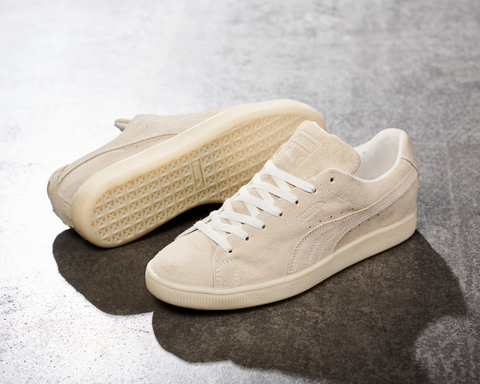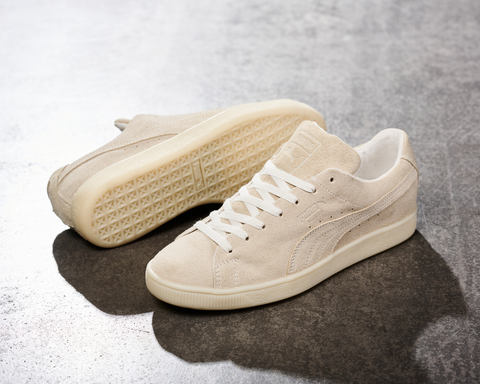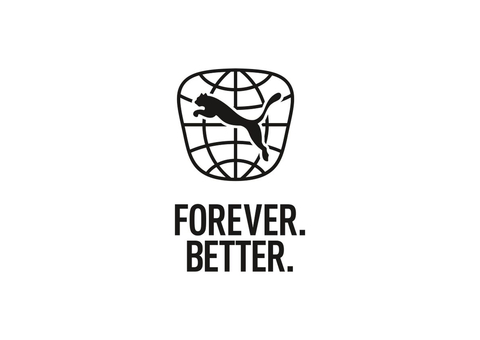HERZOGENAURACH, Germany--(BUSINESS WIRE)--Sports company PUMA showed that it can successfully turn an experimental version of its classic SUEDE sneaker into compost under certain tailor-made industrial conditions, as it announced the results of its two-year-long RE:SUEDE experiment.
In 2021, PUMA created 500 pairs of the experimental RE:SUEDE, using Zeology tanned suede, a TPE outsole and hemp fibres. The RE:SUEDEs were worn for half a year by volunteers in Germany to test the comfort and durability of the shoes before PUMA sent them to a specially equipped industrial composting area operated by its partner Ortessa Group in the Netherlands.
A special procedure had to be established to turn the shoes into compost. First, they were shredded and mixed with other green household waste and placed into a composting tunnel. They were then sprayed with leaching-water from earlier composting that contains nutrients and naturally heated due to the biological activity and controlled air circulation in the tunnel. After approximately 3.5 months, the materials that were small enough (<10mm) to pass through a sieve were sold as Grade A compost for agricultural use (within the standards of the Netherlands), while the remaining materials were returned to the composting tunnel until they too had broken down to the desired level (<10mm). Ortessa Group adhered to all legal requirements for compost applicable at their facilities in the Netherlands during this process.
“While the RE:SUEDE could not be processed under the standard operating procedures for industrial composting, the shoes did eventually turn into compost,” said Anne-Laure Descours, Chief Sourcing Officer at PUMA. “We will continue to innovate with our partners to determine the infrastructure and technologies needed to make the process viable for a commercial version of the RE:SUEDE, including a takeback scheme, in 2024.”
Transparency is another important pillar of the RE:SUEDE experiment, as PUMA will share its insights in a detailed report, so its peers and other interested stakeholders can learn from the experiment and apply the learnings to their own initiatives.
“We learned a lot during the RE:SUEDE trial and how to streamline our industrial composting process to include items that need longer to turn into compost,” said Marthien van Eersel Manager Materials & Innovations at Ortessa. “While all RE:SUEDE materials can decompose, the sole of the RE:SUEDE required more pre-processing and additional time in the composting tunnel to completely break down.”
As a result of the feedback received from the people who wore the RE:SUEDE for half a year, PUMA will improve the comfort of future versions of the shoes by enhancing the overall fit by using a new material pattern for the upper and the sock liner.
The RE:SUEDE experiment was the first programme, together with the novel polyester recycling programme RE:FIBRE, to launch as part of PUMA’s “Circular Lab”, an innovation hub led by PUMA’s innovation and design experts with the aim to create the future of the company’s circularity programmes.
For more information, please visit www.Foreverbetter.com and ortessa.com
PUMA
PUMA is one of the world’s leading sports brands, designing, developing, selling and marketing footwear, apparel and accessories. For 75 years, PUMA has relentlessly pushed sport and culture forward by creating fast products for the world’s fastest athletes. PUMA offers performance and sport-inspired lifestyle products in categories such as Football, Running and Training, Basketball, Golf, and Motorsports. It collaborates with renowned designers and brands to bring sport influences into street culture and fashion. The PUMA Group owns the brands PUMA, Cobra Golf and stichd. The company distributes its products in more than 120 countries, employs about 20,000 people worldwide, and is headquartered in Herzogenaurach/Germany.
Ortessa Group
Ortessa is a group of five enterprising waste companies: veyzle, Lammertyn.net, van Kaathoven, Rondo and Valor Composting. Together, the subsidiaries master all links of waste management, collection and processing and prove daily the power of smart partnering. Each with its own specialism in the field of waste, but with one clear joint mission: to be open about waste. With a realistic, pragmatic and results-oriented view, the Ortessa Group helps clients deal with waste challenges.




